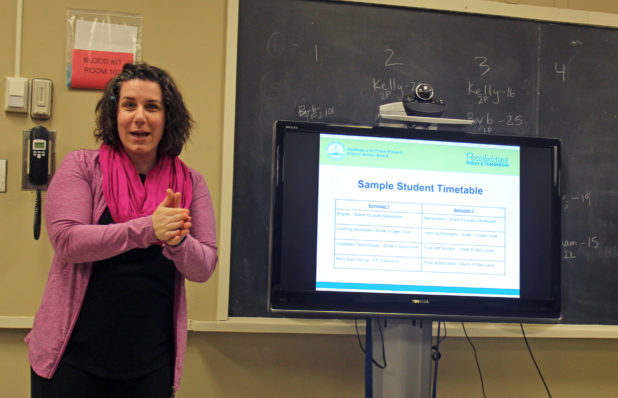Headline News
NHHS gains special programming
March 8, 2018

Quinte Secondary School special education department head Jessica Stuart presents parents with what a student timetable might look like for someone in the Community Integration Program. Quinte was one of three schools that piloted the program through the 2017-’18 school year. / SARAH SOBANSKI Staff
By Sarah Sobanski
Opportunities for special needs students are expanding at North Hastings High School.
The school will introduce a Community Integration Program this September. It starts students with developmental disabilities on the path to an Ontario Secondary School Certificate — not the same as an Ontario Secondary School Diploma but formally recognized by the Ministry of Education.
“I’m very excited because it gives students the opportunity to get the OSSC, which opens options for post secondary school,” said NHHS principal Wayne Stewart, noting the program allows students access to specialized Ontario College Certificate programs such as Loyalist College’s two-year community integration through co-operative education course.
It’s also “certainly something that can be added to a resume,” according to Hastings Prince Edward District School Board student services coach Angie Friel. She, and special education department head for Quinte Secondary School Jessica Stuart, outlined the program for interested parents, local teachers and board representatives at the high school Feb. 28.
To graduate with an OSSC, students must complete seven compulsory credits including in English, geography or history, mathematics, science, health and physical education and arts or technological education. Another seven credits are required in elective courses including esthetics, construction, drama, music, automotive, visual arts, physical education and/or foods and hospitality.
Before the CIP, students could only work toward a Certificate of Accomplishment. With CIP, a student could continue his or her education to build the OSSC to a full OSSD.
“Students would often integrate into other classes… [gym] or foods or music or a tech class — something that they’re interested in — but they would often not take part in ministry academic credits,” said Stuart. “This program is looking to change that. We’re really focusing on the completion of ministry credits, not those non-credit bearing courses… These are credits that the Ontario government has said [for example] every student who earns a Grade 9 math needs to learn. That’s kind of our guide as we move forward with credits for this program.”
Stuart participated in the program at Quinte Secondary School through this school year. Quinte was one of three schools that piloted the project. She said the success of the program, which she had witnessed herself, was why it was being rolled out to the rest of the board.
One of the most important reasons for the success of the program, she said, was that students had new motivation to obtain their credits. Students were working harder because they were working toward the OSSC.
Principal Stewart said “students in non-credit courses face a lack of motivation because they feel they’re doing this work” but not achieving anything. Now, he said, they’ll be “earning credits just like everyone else” and the same credits as everyone else.
The program works with students to accumulate credits until the OSSC is achieved, even if they don’t obtain a credit in the average time frame of one semester.
Friel said students would move forward in the program, keeping their successes from the past semester and work toward filling the “gaps” in the credit they didn’t achieve during the next semester. For example, if a student completed 85 per cent of the Grade 9 math credit, he or she would still move to begin another compulsory credit the following semester. During this time he or she would also work on completing the remaining 15 per cent of the math credit.
CIP will also give students help such as technological supports to complete courses.
“Nowhere in that Grade 9 curriculum does it say that a student needs to independently read this novel without support. He needs to be able to understand the novel, communicate understanding, but there’s nothing to say that that novel couldn’t be audio or couldn’t be supported by having it read to them,” said Friel.
To find out program entry requirements and/or more information, parents can contact the HPEDSB student services department at 613-966-1170 ext. 2237.

















